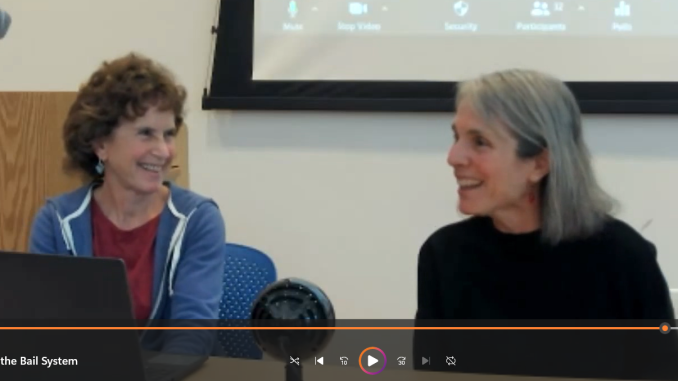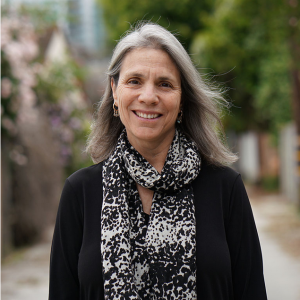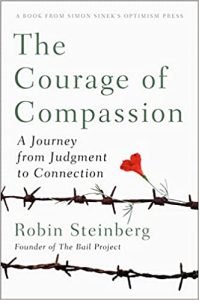
By Nancie Silver —
 The Palos Verdes Democrats met in person and on Zoom on Sunday, January 15 to hear a presentation by featured speaker Robin Steinberg, Founder and CEO of The Bail Project, a national effort to combat mass incarceration by transforming the pretrial system in the US. Los Angeles County Superior Court Judge Tom Long and Cristina Soto DeBerry, Founder and Executive Director of the Prosecutors Alliance, were originally scheduled to join the discussion but were unable to attend the meeting.
The Palos Verdes Democrats met in person and on Zoom on Sunday, January 15 to hear a presentation by featured speaker Robin Steinberg, Founder and CEO of The Bail Project, a national effort to combat mass incarceration by transforming the pretrial system in the US. Los Angeles County Superior Court Judge Tom Long and Cristina Soto DeBerry, Founder and Executive Director of the Prosecutors Alliance, were originally scheduled to join the discussion but were unable to attend the meeting.
If you were unable to attend the January 15 meeting, I encourage you to watch the full presentation by Robin Steinberg. She is a very dynamic and knowledgeable speaker, and what she has experienced in her life-long career in the criminal justice system is all at once eye opening, heartbreaking, and inspiring. I came away from her talk with a new understanding of how our current criminal justice system works and its flaws, as well as the damage it inflicts on not just those who cannot afford bail, but all of us.
Editor’s Note: To help the reader delve more deeply into the details of the presentation, we’ve annotated the time (e.g. 1:30 is 1 minute 30 seconds) that the discussion occurs in the video. The video is provided at the end of this article.
00:06 Ann Nye, 2nd Vice President and program moderator, introduced Robin Steinberg, CEO of The Bail Project. This organization is on a mission to end cash bail and create a more just, equitable, and humane pretrial system. Originally a public defender in the Bronx, Robin founded three high-impact organizations, including The Bronx Defenders, and moved to California five years ago. There’s just one state and the District of Columbia that has functionally eliminated cash bail. In today’s meeting, Ann said we are focusing on cash bail to “reimagine a world in which systems of support and care, not punishment, create public safety.”
02:06 Robin began her presentation talking about her early work as a Public Defender, and her frustration watching her clients who couldn’t afford bail end up in jail, pleading guilty as a way to get out of jail.
03:25 Robin spoke about the dynamic of the cash bail system, the reason for the growth of jails, who is in jail and why. “Cash bail is the primary driver of mass incarceration in this country.”
04:18 Robin spoke about why all of us should care about how the criminal justice system operates: “it is a reflection of all of us…of our values as Americans and as people who believe in democracy…everybody who is charged with a crime in America is entitled to the presumption of innocence.”
05:15 Robin shared that the other reason we ought to care is because this system erodes the value that all of us are entitled to equal justice under the law. This leads to a two-tiered system of justice to be released, one for people who can pay their way to get out and those who can’t. The consequences of being held in jail…is an incredibly destructive force.
06:32 Our cash bail system was built as an incentive to get people to return to court; it was designed as a release mechanism, but that doesn’t happen. “This cash bail system is the driver of mass incarceration and the driver of racial disparities”.
08:30 In 2005, Robin and her husband started the Bronx Freedom Fund, a revolving bail fund, to pay bail for the clients. They wanted to test if the main reason clients came back to court was to get their bail money returned. They knew what the impact of being jailed was on the individual, but they wanted to understand the impact on the client’s criminal case as well. They saw their clients came back to court 95% of the time and that over half of the cases got dismissed when they could fight their case from home. They won The Audacious Project Prize (product of The Ted Talk), which allowed them to start The Bail Project which operates on the national level.
12:31 Robin said, another reason people give as to why cash bail is needed is to address public safety concerns. But then that doesn’t solve the problem because someone who has money can pay bail and someone without money, can’t pay bail. So, Robin poses, why does the system still exist and why have we not done better?
14:20 We need to understand the profit motive for keeping our cash bail system operating the way it does. “The profit motive in our bail system is the multi-billion-dollar bail bond industry that is backed by insurance companies who profit off of the cash bail system.” The bail bond industry pushes for legislation to create bail schedules; desperate families will pay 10% of the bail amount to the bail bond person. California has some of the highest bail schedules in the country; the bail bond system has created some of the biggest jails in the country, such as in Los Angeles County. The Bail Project has a revolving bail fund that gets replenished when their clients show up for their court date.
17:35 The Bail Project learned that the keys to getting people back to court are effective court reminders, reliable transportation, and when its staff serves as a connector to social services that clients need.
Q&A:
19:20 Question: Why do prosecutors prefer cash bail?
Answer: As a system, if you hold someone in jail, they are more likely to plead guilty, and to get a guilty verdict. Studies have shown, you are more likely to commit a crime if you are held in jail pre-trial. Let’s assume that the judges and prosecutors are acting with integrity. We need to talk about how we may be justifiably concerned that someone may harm another person and not use money as the determining factor to keep someone in jail pre-trial.
22:36 Question: If you take money out of the equation and you are worried about flight risk, can a judge hold a person in jail?
Answer: It depends on the statutes; Illinois passed the Safety Act, which I think is the Gold Standard so far in this country; it’s a bill that eliminates the cash bail system. The bill was supposed to go into effect January 1, 2023, but a lawyer filed a suit saying the bill was unconstitutional. If the judge believes the person, based on evidence, is a flight risk or is a danger to the community, they can detain the person.
27:35 Question: In March 2021, the CA Supreme Court ruled in the Humphrey case that detaining a person pretrial solely because they cannot afford bail violates due process and equal protection. Why hasn’t there been a change in the bail schedule, LA County’s formal guidelines for the bail cash amounts based on alleged offenses?
Answer: The Humphrey case was a legal case, not a law. The judge said setting excessive bail is unconstitutional, but unfortunately judges don’t follow the ruling in the case.
30:40 Question: SB 10 was passed by the CA legislature to end cash bail; then there was a referendum and Proposition 25 was put on the ballot. What were the reasons Prop. 25 didn’t pass in 2018? What should the criteria be for ending cash bail?
Answer: Prop 25 divided everybody! One objection was that the statute, as it was passed. relied on risk algorithms (Risk Assessment Tools) that put in data that was based on prior criminal data that we know is embedded with systemic racism. The other objection was that supportive services ought to be part of what you think about when someone is released, but pre-trial services were housed in Probation, a law enforcement arm, and many proponents thought they should be part of another agency.
34:48 Question: How do other countries deal with this issue of cash bail and are we the only one?
Answer: Only the US and Philippines have a cash bail system, with the US bail bond industry driving mass incarceration.
35:56 Question: What would you recommend to address these concerns about the cash bail system?
Answer: We need to start with a Needs Assessment, rather than just a Risk Assessment to present information at the hearing. We also need to do a risk assessment about what is the potential harm that will come to this individual and their family if you hold them in jail.
38:10 Question: Judges tend to rule to cover themselves so that if something goes wrong, they are protected. When you do a Needs Assessment, would it solve that problem?
Answer: Judges and Prosecutors need to have courage, use the facts that are available, realize there are outliers and the unusual bad story. Society needs to understand there might be an unusual case occasionally, but we have to rely on the data and not overcompensate by tightening up on keeping people in jail.
45:11 Question: Knowing what it’s like to be in jail, what else can I do to change the bail system?
Answer: Writing to your elected officials, court watch program, educate your friends, learn about the judges and district attorneys and see their position on cash bail, asking people to get proximate to the problem (go to court and when bail gets set), remind people that those who get arrested are human beings.
48:02 Question: During the pandemic, LA County eliminated cash bail from 2020 to 2022 to eliminate jail populations. There was a lot of evidence there wasn’t a rise in crime and people did go back to court for their trial.
Answer: The pandemic was a frightening time to be in jail. It was an interesting time where people contemplated not refilling jails, but homicide rates climbed due to many factors not related to cash bail, so jurisdictions just ended up re-incarcerating people. Now homicide rates are starting to come down as things stabilize.
51:15 Question: With the folks that did not return to court, and a bench warrant had to be issued, what was learned?
Answer: No one fled the jurisdiction; most cases were related to life circumstances; there was almost no flight risk issue. Charge-related issues sometime indicate a need for more services that are not being met.
53:40 Question: What is your opinion about the recent class-action lawsuit filed in Nov 2021 by six LA residents jailed because they can’t afford to pay bail, which is the first case to challenge LA’s bail schedule?
Answer: The Bail Project does not bring lawsuits, but they provide support like data to the lawsuits.
55:35 Question: Should the January 6 insurrectionists get bail?
Answer: That’s why this is a bipartisan issue; it’s about fundamental fairness. A judge needs to determine if the insurrectionists are a threat to our community.
56:54 Question: Following up on electing good legislators and good judges, have you proposed some language that we want legislators to vote on to determine who should be locked up for public safety and who shouldn’t be?
Answer: Holding someone in pretrial detention should be the exception not the rule. We don’t have language for legislation, but we do have a document called After Cash Bail on our website. The Bail Project folks would be happy to talk to anyone who is proposing legislation. The 2021 Illinois bill [The Illinois Pre-Trial Fairness Act] is a gold standard bill. Don’t underestimate the power at the state level or local level, to make change about the cash bail system.
1:01:54 Dency Nelson said his daughter is involved with The Innocence Project and spoke with Cristine Soto DeBerry, Founder and Executive Director of Prosecutors Alliance, about these issues. We had hoped to have Cristine join us to speak about her organization, which is guided by the principals of the Twenty-one Principles of a 21st Century Prosecutor. There is a section in this document about ending cash bail.
1:05:35 In conclusion, Robin restated that one out of two families in America has a person or knows someone who has been booked into jail; this is from a study by the Pew Research Center. “There is no other here; it’s all of us…. That makes us all responsible for what happens in the criminal justice system.”
 Editor’s Note: If you enjoyed Robin Steinberg’s talk and want to learn more about her journey as a public defender, please take the time to check out her book that is coming out in April, The Courage of Compassion: A Journey From Judgment to Connection – it is available to pre-order on Amazon.
Editor’s Note: If you enjoyed Robin Steinberg’s talk and want to learn more about her journey as a public defender, please take the time to check out her book that is coming out in April, The Courage of Compassion: A Journey From Judgment to Connection – it is available to pre-order on Amazon.

Excellent discussion. I too thought that when cash bail ended during Covid, it was over, for good. Apparently it continues its harmful course. Keeping a person in jail prior to trial certainly is unjust punishment and presuming guilt of the person, not the person’s innocence. Hard to imagine that writing letters will change things. And I don’t hope for another bout of Covid. But things do have to change.